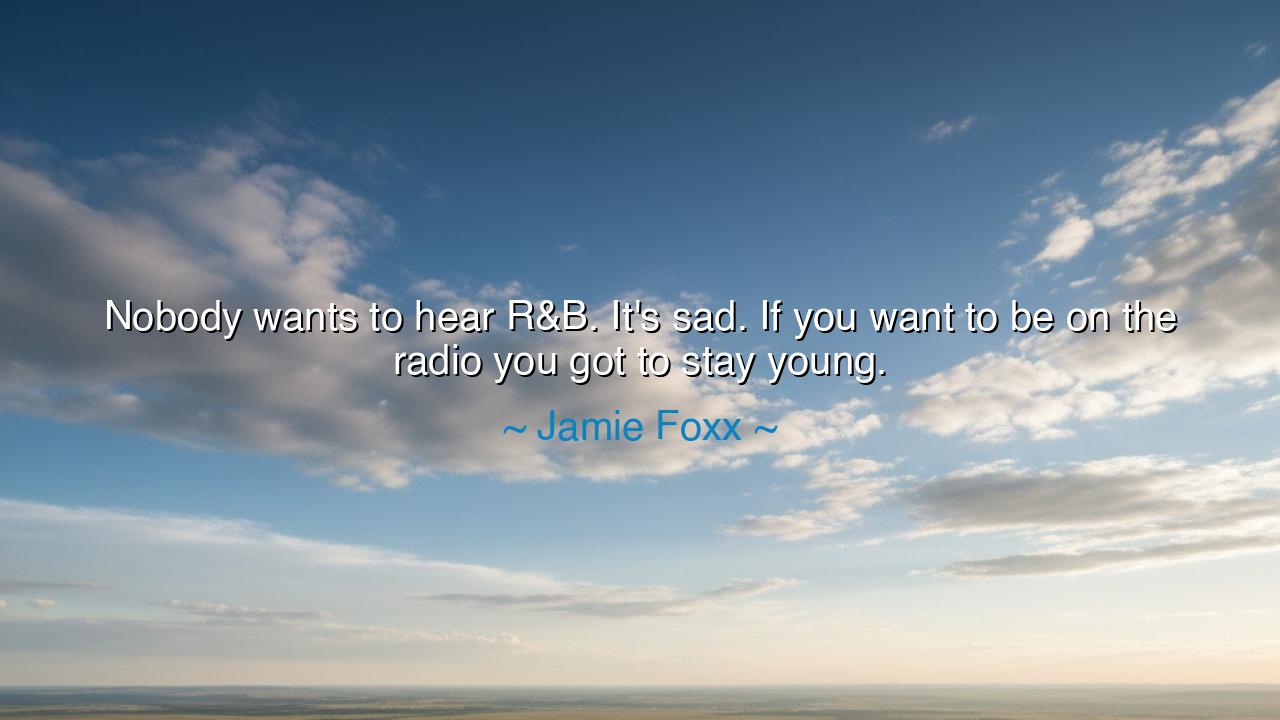
Nobody wants to hear R&B. It's sad. If you want to be on the
Nobody wants to hear R&B. It's sad. If you want to be on the radio you got to stay young.






The words of Jamie Foxx, “Nobody wants to hear R&B. It’s sad. If you want to be on the radio you got to stay young,” ring with the quiet sorrow of an artist who has witnessed the turning of cultural tides. Beneath their casual phrasing lies the lament of an age where authentic emotion gives way to fleeting fashion, where art that once spoke to the soul is pushed aside for rhythms that serve only the moment. Foxx, a man whose life bridges music, comedy, and film, speaks not with bitterness but with a weary truth. He reveals a world where youth is worshipped, and anything seasoned by time—wisdom, depth, or emotional complexity—is cast into shadow. His words are not just about R&B, but about the larger tragedy of a culture that forgets its heart in pursuit of novelty.
In the golden years of rhythm and blues, music was the voice of feeling itself. The greats—Marvin Gaye, Aretha Franklin, Stevie Wonder, Luther Vandross—did not chase youth; they sang of love, longing, and the human condition. Their art was timeless because it was true. To hear R&B in its purity was to feel one’s own heart reflected in melody—to remember joy, loss, and redemption. Yet, in the modern age, the airwaves are dominated by the quick and the catchy, by what dazzles for a moment before it fades. Foxx’s lament captures the sorrow of the artist who still believes in depth, in soul over spectacle, but finds the world moving too fast to listen.
The ancients too knew this sorrow. In Greece, the poets of the old order—those who wrote of virtue, tragedy, and divine love—were one day silenced by the noise of lesser songs. The young flocked to entertainment that pleased the ear but not the spirit. Plato himself warned that when a civilization begins to mock its own music, it has already begun to lose its soul. Foxx, in his modern tongue, echoes this ancient warning: when we cease to value the mature voice, when we dismiss the music of heart and history as outdated, we not only lose an art form—we lose a part of our humanity.
There is also in his words the bitterness of time, for fame in the modern world is not eternal but seasonal. To “stay young,” as Foxx says, is the demand of an industry that fears silence more than emptiness. It is a command to chase the ever-changing tide, to imitate the youthful energy of the next generation rather than to embrace the dignity of experience. Yet this is a false pursuit, for youth is not eternal in the body but in the spirit. True creativity does not age; it transforms. The tragedy, then, is not that R&B has grown old, but that society no longer honors the grace of growth.
Consider the story of Ray Charles, who defied this very truth. In the 1950s, he blended gospel, jazz, and blues to create something raw and new—R&B itself. He faced scorn from both the church and the mainstream, yet his sound endured because it was authentic. When others chased trends, Charles chased truth. Decades later, his music still stirs hearts because it carries the eternal spirit of humanity. Had he tried to “stay young” in the shallow sense, his work would have vanished with the passing of its fashion. Instead, he proved that the soul of art outlives the body of culture.
Foxx’s lament, then, is not a complaint—it is a call. A call to remember that the purpose of music, and of all art, is not to flatter the moment but to reveal the timeless. The artist must not bend entirely to the market’s demand for youth, nor should the listener close their ears to the wisdom of the seasoned voice. For when the world honors only the new, it forgets how to feel. The truest songs are not sung by those who seek attention, but by those who seek meaning—and meaning, like wine, ripens with age.
So let this teaching be carried forward: Do not abandon the old songs, nor the mature voices who sing them. In every generation, the heartbeat of truth grows faint beneath the clamor of fashion, yet it never dies. To love art that endures is to remain young in spirit, even as the body ages. When the world tells you to “stay young,” remember: it is not your years that define your vitality, but your sincerity. For though the radio may forget, the soul remembers. And in that remembrance, as Jamie Foxx so mournfully implies, there lies the sweetest and most enduring kind of music—the kind that never needs to chase the world, because it already lives within it.






AAdministratorAdministrator
Welcome, honored guests. Please leave a comment, we will respond soon